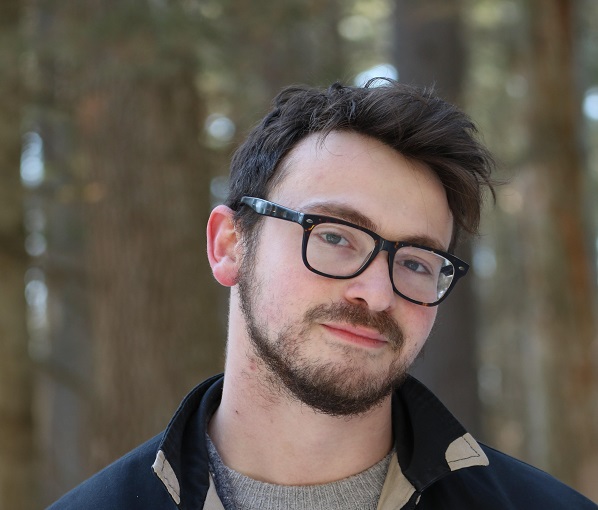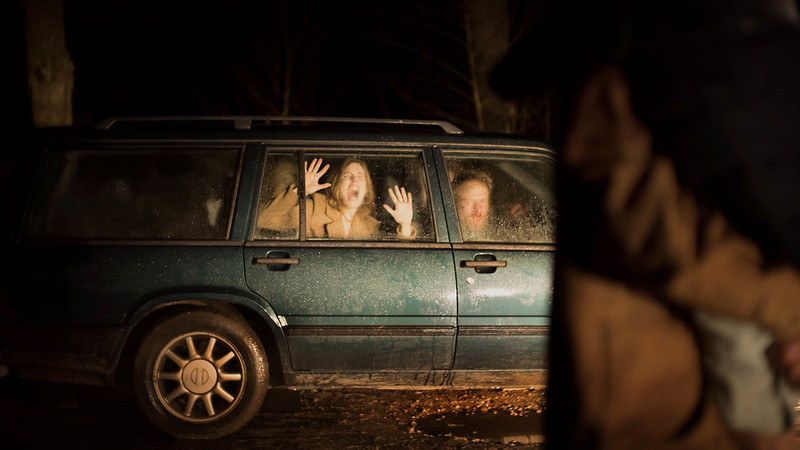For its virtual-only edition this year, the 2022 Sundance Film Festival has limited its Midnight section to six titles that its programmers say “defy genre classification,” from skin-crawling horror to surreal comedy.
Of course, that distinction seems partly necessary because of how much horror dominates the fest’s main categories this year, from Chloe Okuno’s paranoid “Watcher” and Nikyatu Jusu’s eerie “Nanny” cracking the U.S. Dramatic Competition to DIY sci-fi duo Justin Benson and Aaron Moorhead storming the NEXT section with their destabilizing “Something in the Dirt.” It’s been an unnerving few years, and this Sundance’s lineup reflects that more than most.
But what’s clear from diving into the fest’s Midnight selections this year is that programmers focused less on highlighting any particular genre than they did on prioritizing the late-night audience experience, chasing shock value with titles that delight and disturb in about equal measure.
The transcendently nasty buzz you can get off watching Christian Tafdrup’s “Speak No Evil,” especially, would have made the cold-as-night Danish import a word-of-mouth hit on the ground in Park City. A pitiless social satire, it’s one of a few Midnight titles this year that lulls audiences into a false sense of security before snapping shut with the brute efficiency of a steel-jaw trap.
Of course, it all starts out agreeably enough. At a Tuscan villa with their young daughter, Agnes (Liva Forsberg), Danish couple Bjørn (Morten Burian) and Louise (Sidsel Siem Koch) befriend a Dutch couple, Patrick (Fedja van Huêt) and Karin (Karina Smulders), who are vacationing with their young son, Abel (Marius Damslev). But when they accept Patrick and Karin’s invitation to spend a weekend at their place in the Danish countryside, the meek Bjørn and only moderately more forceful Louise start to realize how little they know about their hosts.
For all their entreaties toward hospitality, there’s an opacity to Patrick and Karin that makes the guests uneasy. It’s the nagging sensation they’re laughing at some private joke, and the way the atmosphere in their house fluctuates from hot to cold. And though Patrick makes it clear he’s the alpha male in residence, manipulating the Danes through a veneer of amiable calm, he seems sincere about bonding with Bjørn. We sense on some level that these are predators toying with their prey, but not the nature of their game.
Then come the casual cruelties. One minute, the children are performing a dance routine they’ve dreamed up; the next, Patrick is showering abuse down on Abel as if he’s flat-footing a high-pressure recital rather than play time. Driving back from dinner, Patrick insists on blasting his music at a deafening volume, as Louise pleads for him to turn it down. And why does Karin keep disciplining Agnes, as if she were her own daughter? There’s no easier explanation for all these incidents than culture shock, and at first the Danes are willing to accept that this Dutch family does things a little differently. But their unpleasantness feels less than oblivious.
No good can come of the film’s isolated woodland setting, nor Bjørn’s cringing impotence, and especially not that dull pair of scissors Karin’s so fond of wielding. Inspired here and elsewhere by Lars von Trier’s “Antichrist,” Tafdrup reminded me also of Michael Haneke’s “Funny Games” in how its characters dig their own graves through compulsory courtesy. Filmmakers tapping this cold Nordic vein of psychological horror often operate like lobster chefs, stunning their characters in frigid water before turning up the heat. And Tafdrup, working from a script he co-wrote with his brother Mads, steeps the proceedings in such a steady, persuasive sense of dread that it’s difficult to determine exactly when enough lines have been crossed to validate the Danish couple’s discomfort.
Assisted by the coolly distanced work of cinematographer Erik Molberg Hansen, “Speak No Evil” patiently draws the darkness out of its landscapes, which at first appear merely impassive before revealing themselves an unforgiving backdrop to atrocity. The specific horrors visited upon Bjørn and Louise are best left unsaid, but the film emerges as a soul-chilling recapitulation of Stellan Skarsgård’s great line from David Fincher’s “The Girl with the Dragon Tattoo” remake: “It’s hard to believe that the fear of offending can be stronger than the fear of pain.”
Of course, there’s no need to choose: both kinds of fear are radiating off the screen in hot, frantic waves by the film’s end. It’s a perfect pickup for Shudder, AMC Networks’ horror-centric streaming service, which acquired the film last week and will release it to subscribers later this year.

Elsewhere in the Midnight section, Mimi Cave’s “Fresh” mines the related anxieties and social contracts of modern dating for sick kicks of its own, though it’s working in a more cartoonish, crowd-pleasing key. The film was acquired by Disney-owned Searchlight Pictures ahead of its Sundance premiere and will premiere on Hulu in March. And such a high-profile distribution plan makes sense for “Fresh,” which benefits immensely from the twisted chemistry of its leads, Cave’s confidence behind the camera, and the spiky script devised by Lauryn Kahn.
Daisy Edgar-Jones, of Hulu’s “Normal People,” stars as Noa, a twentysomething in modern Los Angeles who regularly scrolls dating apps in search of a decent guy. She’s exhausted by this pursuit, and the film only needs one excruciatingly bad date to show us why. When Noa is approached in the produce aisle of her local supermarket by Steve (Sebastian Stan), a handsome and seemingly available stranger, she interprets this encounter as the answer to her prayers.
Though Noa’s best friend Molly (Jojo T Gibbs) raises an eyebrow at Steve’s lack of social media, their courtship plays out in predictably sweet fashion—until Noa lets Steve spirit her away to a remote location, at which point his mood seems to darken. “Fresh” doesn’t drop its title until 40 minutes in, when the meet-cutes and first-date foibles of its first act end with a rug-pull so savage—and, in Cave’s hands, so chillingly plausible—that you share Noa’s sudden, sinking realization that she’s trapped.
“Fresh” has been teased in marketing materials as a movie about “the horrors of modern dating,” though it would do the film’s admirably twisted story a disservice to assess it first as social commentary. That’s not to say there’s no substance to the film’s view of violent masculinity as an ingrained cultural behavior, nor to deny the corrosive truth of its assessment that the gift of fear, of gut instinct, is often all women can rely on to survive encounters with men who mean them harm. But, in “Fresh,” Cave and Kahn acknowledge the traumatic weight of these realities without making them the film’s point. Noa’s ordeal leaves your stomach in knots, as does the horrifying normality with which Steve’s snare closes around her, but the fantastically cruel and darkly comic twists “Fresh” delivers from there are what give the film its bite.
Despite surface-level similarities in their approach, Emerald Fennell’s “Promising Young Woman,” which premiered at the 2020 Sundance Film Festival, was comparatively much harder candy. Though “Fresh” has the same visual gloss and is just as unflinching in many sequences—like the one where Noa realizes too late that Steve has drugged her drink—it lacks the former film’s annihilative rage and doesn’t so explosively disrupt genre conventions to make its points.
More often, Cave and Kahn’s approach calls to mind “Ready or Not,” Matt Bettinelli-Olpin and Tyler Gillett’s pulp class-revenge fantasy, in which a new bride spent her wedding night battling a mansion estate’s worth of bloodthirsty in-laws. “Fresh” treats its setup as a springboard to carnage, in other words, and the absurdity of both the performances and the twists keep you wondering where it’ll all land. A warm and wry presence, Edgar-Jones burrows so deeply into Noa’s headspace that you can’t always track her survival strategy, which keeps Noa’s mind games with Steve—played wolfishly by Stan, who needs characters this diabolical to enhance his blank-slate qualities—interesting from an acting standpoint. It’s only a shame that the undercooked third act can’t find a satisfying way to pay off their dynamic—or tie up any of the pesky loose ends it introduces.
Out of all the Midnights at Sundance this year, “Fresh” feels by far the most polished, from its slick production design to a suitably toothy soundtrack that deploys the cheesy synths of Animotion’s “Obsession” to particularly nirvanic, novel effect. Given this, the visceral impact with which Cave and Kahn handle the film’s grisliest moments is cause for celebration. “Fresh” knows what it is, what it’s not, and how far to push its queasy premise; even if it can’t quite stick the landing, that force of confidence ensures that “Fresh” at least lives up to its title.

If “Fresh” is the section’s popcorn pleasure, Monia Chokri’s “Babysitter” is its acquired taste, a madcap comedy of sexual mortification that skewers toxic masculinity by shoving it headlong through the looking glass. Set in a suburban soap-bubble dimension where all the soft pastel colors have the same plasticized sheen as the characters’ screw-loose smiles, the film’s bizarre atmosphere—reminiscent of Jocelyn DeBoer and Dawn Luebbe’s “Greener Grass” from three Sundances ago—consistently hovers above reality while channeling the earnest, pitiable befuddlement of its characters.
Adapted by the Canadian playwright Catherine Léger, from her stage play of the same name, the film focuses on a middle-aged man named Cédric (Patrick Hivon) who’s suspended from work after drunkenly forcing a kiss on a female reporter during her broadcast. At home with his long-suffering wife Nadine (Chokri) and their wailing infant, Cédric doesn’t fully grasp the severity of his offense. But once his brother, Jean-Michel (Steve Laplante), convinces Cédric to pen a confessional book about his past misogynistic behaviors, the pair’s insincere stabs at self-rehabilitation line up with their more sincere passion for self-aggrandizement. Problem solved, or so they think. But when babysitter Amy (Nadia Tereszkiewicz) enters the picture, with her own ideas about women’s liberation, her otherworldly presence begins to entrance Cédric and Jean-Michelc, unlocking deep-seated feelings in Nadine as well. All three find themselves on a collision course with their sexual neuroses and biases, even as they fumble to grasp the power dynamics that underpin them.
Though the film’s wide-ranging and punchily imagined dialogues grapple with double standards and shifting definitions of feminism and sexual freedom, Chokri’s direction is even more persuasive on the subject, rarely passing up an outrageous sight gag or sudden shift in perspective to exaggerate and thus expose the lechery of a character’s gaze. Actors’ faces often positioned at the edges of her frame, Chokri lets close-ups melt into one another, as if the characters can’t help but intrude upon one another’s stifled inner monologues. Conducting the proceedings with a cartoonish exuberance that often tilts into mania, Chokri and editor Pauline Gaillard find a destabilizing visual rhythm for the film that suits and occasionally overwhelms all its bombastic back-and-forths. As darkly funny and incisive as its commentary can be, especially around unwieldy structures of performative feminism, you can’t help but occasionally lose sight of it in all the discombobulating zooms and pans.
Chokri often keeps her focus on the high style itself more than the dialogue it fancifies. But, then again, “Babysitter” is less concerned with coherent plot progression or dramatic resolution than it is with heightening a fugue-like state in which the characters’ convoluted parameters of sexual and gender expression can contend with the swirling, more honest peculiarities and paradoxes of their desire. Chokri shot “Babysitter” in gauzy 35mm, and the lurid dreaminess of its visuals keep you enthralled, even as the ersatz, ping-ponging zaniness of its execution does its utmost to throw you for a loop. “Babysitter” is still seeking distribution, and it’s such an endearingly, refreshingly weird satire that, out of all the Midnight titles at Sundance this year, it feels the most destined for cult status.












